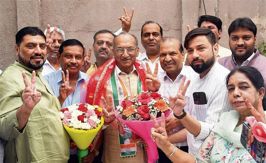
iStock
Pervin Malhotra
email your queries to [email protected]
Q.I am currently in BTech third year (CSE). I am interested in exploring geospatial engineering. Is it too late for me to get into this field now? What are the career opportunities that I can still explore in GIS? — Raminder Jit Singh
A. GIS is fast becoming a part and parcel of our daily lives. Whether it is reaching a particular address in time or making deliveries, Geographic Information Systems are the most obvious choice. Thus, there is an increase in demand for professionals in this field with increase usage of the technology. Geospatial technology is about assembling, storing, manipulating and displaying geographically referenced data. It is used just about everywhere — from digital map making, site selection, finding the best routes, solving environmental problems, exploring natural resources, urban planning and solutions for other problems. As for the job prospects, besides private companies, major employers in the GIS sector are the central and state governments as well as defence services. Job profiles in GIS range from project manager, project scientist, technical assistant, research associate, GIS environment/business analyst, GIS engineer, GIS programmer, etc.
Prospects of Functional Hindi
Q.I am a student of BA (Hindi). What is functional Hindi? What are its prospects? — Kishore Kalra
A. The functional aspect of a language is concerned with mainly the formal functions of a language, as distinguished from informal communication and literature. Hence, functional Hindi includes Hindi as a language of business, administration and foreign relations. Accordingly, you’re likely to find careers in functional Hindi in the corresponding professions.
The Official Language Act has mandated the use of Hindi — along with English — in official work, in general orders, rules, notifications, administrative and other reports, press releases, tenders, permits and contracts, etc. Hence, there are opportunities for Hindi graduates and post-graduates in different Central and State Government Offices as well as Public Sector Undertakings, especially banks, as Manager and Asst. Manager (Official Language), Hindi Translator, Hindi Officer and Public Relations officers. You can also work as a Hindi translator in a publishing house and foreign embassies.
The growth in newspaper circulation and the proliferation of news channels, portals and websites, positions as editors, assistant editors, proof readers, newscasters and reporters etc. are available for degree holders in Hindi journalism.
While domestic BPOs have a huge requirement of Hindi speakers, advertising agencies also opens doors for talented Hindi copywriters and scriptwriters.
To site an instance (and this is just an example), Tamil Nadu, despite linguistic politics (it has long opposed the imposition of Hindi in the state), has seen a rise of 50 per cent Hindi speakers. The current preference for CBSE and ICSE schools has also spurred a rise in students opting for Hindi as their second and third language preference.
Besides helping people heading for jobs outside their state, functional knowledge of Hindi can help at every level. For instance, a cab driver who is conversant with the language would be better able to communicate the fare, route etc. with his passengers, as would a tourist guide or shopkeeper as even someone working in a large company. For instance, many company bosses in the south or even East happen to be from the North. Since they predominantly speak/understand Hindi, familiarity or functional knowledge of the language makes it easier to work with them. Incidentally, Hindi as a foreign language is taught in various universities in Western countries. Postgraduates in functional Hindi, preferably PhDs, are sought for employment as teachers.
And please don’t get me wrong. We’re not debating the superiority or otherwise of any language here.
As you are currently in third year of your BTech degree, it would be better to complete it and then go for PG specialisation in GIS. Geospatial engineering being a specialised field, requires a background in science. Students from agriculture, computer science, engineering, geography, geology, or IT fields can pursue MSc/MTech courses in Geospatial field and Remote Sensing. You also have the option to follow up with a Ph.D. Diplomas and certificate courses are also available.



























